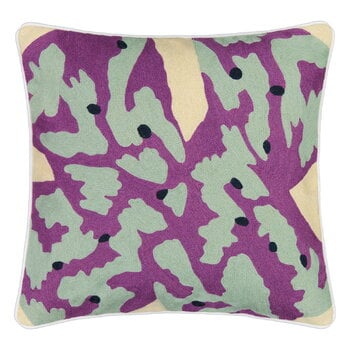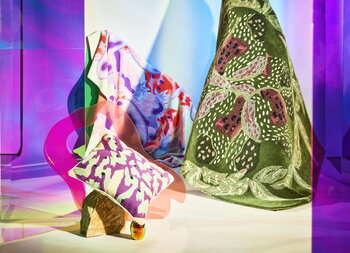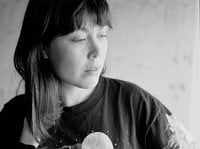Finarte's Popsicle cushion cover has a colour palette delightfully wild and calmly harmonious at the same time. The cushion is decorated with a mesmerising pattern designed by textile artist Minni Havas, in which abstract bright colours and patterns blend together, creating shapes that are both everyday familiar and dreamily strange at the same time. The cushion cover is hand-embroidered and has a cotton backing. The eye-catching pillow is perfect for both the living room and the bedroom, either on its own or as a cheerfully colourful combination of multiple Popsicles.
Popsicle cushion cover, 50 x 50 cm, lilac
Finarte
Description
Finarte's Popsicle cushion cover has a colour palette delightfully wild and calmly harmonious at the same time. The cushion is decorated with a mesmerising pattern designed by textile artist Minni Havas, in which abstract bright colours and patterns blend together, creating shapes that are both everyday familiar and dreamily strange at the same time. The cushion cover is hand-embroidered and has a cotton backing. The eye-catching pillow is perfect for both the living room and the bedroom, either on its own or as a cheerfully colourful combination of multiple Popsicles.
Product details (8)
- Material
- Hand embroidered wool, cotton backing
- Colour
- Lilac, green
- Length
- 50 cm
- Width
- 50 cm
- Zipper
- Yes
- Weight
- 0.3 kg
- Care instructions
- Vacuum cleaning and spot clean with mild wool detergent.
- Notes
- Inner cushion sold separately.
- Product ID
Designer
Minni Havas (born 1983) is a Finnish illustrator and textile designer, who is especially known for her photorealistic fashion illustrations and the patterns she designs for fashion and interior design brands. Havas studied fashion design at Aalto University, and or a few years after graduating, she ran her own clothing brand Minni f. Ronya together with her colleague Anne Törnroos. Since then, Havas has collaborated with Finnish brands like Finarte, Vimma and Minna Parikka, as well as the French fashion house Maison Margiela.
View all productsReviews (1)
5
Based on 1 reviews
-
Y
Yuko J
Hong Kong
254 days ago
Sustainability
The Product Sustainability Framework, our criteria of sustainable design, helps you find the most sustainable products in our selection. Read below which sustainability criteria this product has met.
Working conditions & labour 7/9
-
Equal opportunities for all employees
-
Commitment to UN Global Compact, fair compensation for all employees
-
Corporate responsibility requirements defined and communicated for suppliers
-
Systematic work for improved inclusion and well-being in the workplace
-
Transparent supply chain
-
Suppliers' compliance to a code of conduct ensured
-
Support for community involvement in the supply chain
-
Direct suppliers audited and certified
-
Compliance to the UN Guiding Principles on Business and Human Rights ensured in the supply chain
Eco-friendly production 6/9
-
Fair and resource-wise water-use in production
-
No incineration or landfilling of returned items
-
No use of endangered species as materials
-
No direct environmental emissions or waste (excl. GHGs) from production
-
Material-efficient and ecological packaging
-
No potentially harmful chemicals used in own production
-
The sustainability of direct suppliers' production is addressed and monitored
-
Production and material sourcing that respect biodiversity, animal rights, and natural ecosystems
-
Positive impact on nature’s well-being through operations that regenerate natural ecosystems
Climate impact 4/8
-
Company's direct greenhouse gas emissions identified and commitment to reduction
-
Product's carbon impact identified and commitment to reduction
-
Guidance on energy- and eco-efficient use of the product
-
Carbon footprint of the product calculated and goals set to reduce it
-
Contribution to climate initiatives beyond the brand’s direct operations
-
Low-carbon or compensated transportation
-
100 % renewable energy in own production and operations
-
Carbon neutral or carbon negative product
Sustainable materials 5/6
-
Sustainable and long-lasting material choices
-
No harmful or hazardous substances
-
Responsible raw material sourcing and production
-
Materials suited for circularity: monomaterials, recyclable finishings, renewable or recycled contents etc.
-
Ecological materials: natural, biodegradable, recyclable or recycled contents
-
Outstanding materials in terms of innovativeness, responsibility, sustainability and circularity: local production or sourcing, 100 % recycled content, C2C-certification etc.
Circular design 5/5
-
High aesthetic quality promoting long-term use of the product
-
Technically durable product design and material choices
-
Design for enduring life-long quality
-
Design and support for product maintenance, repair and upgradability
-
Innovative circular design solutions: circular service system, resale platform, remanufacturing, collection of used products, etc.








